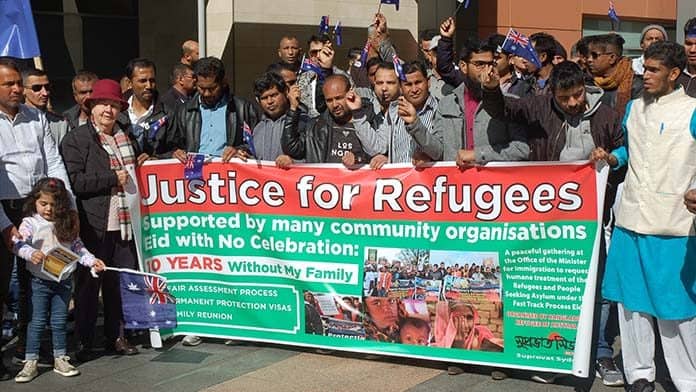A proposal from the Refugee Council of Australia (RCOA) to a Parliamentary Committee to consider granting residency to 17,000 refugees on temporary visas in return for picking fruit has attracted support from across the political spectrum.
Under RCOA’s proposal refugees would get residency after one year of working in the bush. Parliamentary committee members from Labor, Liberal and the Nationals have all indicated interest in the proposal to solve the COVID-created shortage of backpackers to pick this year’s crop of fruit and vegetables.
Yet, astonishingly, although Labor’s policy is to abolish temporary protection visas (TPV) and the Safe Haven Enterprise Visa (SHEV), Labor’s committee member, Julian Hill, is reportedly in agreement with the Nationals’ Damien Drum, saying that the refugees should have to work for two years to get residency!
It is not just that Hill seems to be flouting Labor policy, there is a fundamental problem with the proposal. The Tamil Refugee Council has called it a “bonded labour scheme.”
The refugees are boat arrivals most of whom have been here for eight or nine years already. They have been found to be owed protection because of the persecution they have suffered in their home countries. It is already an abuse of their human rights that they are only granted temporary protection.
Yet Labor’s Julian Hill backed up his support for the scheme, saying, “If they do the right thing by the country and prove their commitment then we should embrace them in return.”
Embrace them in return!? Refugees don’t have to prove anything. They should be embraced because they need protection from persecution.
The working conditions in the bush are notorious. The Fair Work Ombudsman has just announced an investigation into the case of a young woman, sexually harassed in a fruit-picking job and paid as little as $2.50 an hour.
The government reinstated its seasonal workers program in August to try to address the labour shortages in the agricultural industry. In September over 160 workers from Vanuatu were brought to the Northern Territory to work on farms after two week’s quarantine.
Those seasonal workers are also treated as a reserve army of labour; they should also be given permanent residency.
It is shocking that tens of thousands of refugees in Australia are on temporary visas, with no right to family reunion, no right to study, and no right to travel. Thousands face destitution because they are denied JobKeeper and JobSeeker.
But requiring refugees to work in rural areas for a year (or two) before granting residency only helps to legitimise the government’s anti-refugee policies and its discriminatory treatment of them. Refugees need permanent visas, nothing less.
Mobile phone ban stalled
A massive mobilisation of refugee supporters across the country—with protests, petitions and lobbying—has stalled government moves to ban mobile phones from detention centres.
The Bill will give wider search and seizure powers to Border Force officers, as well as giving power to the Immigration Minister to prohibit certain items, like mobile phones, from immigration detention.
Although the Bill passed the House of Representatives, it was not put to the Senate in the September sitting.
Parliament sits again in October. It will be Tasmanian Senator Jacqui Lambie’s vote that will determine whether or not the government can pass the legislation.
Removing phones from people in immigration detention would cut off a lifeline to family and legal support as well as make it much easier for Border Force to maintain secrecy and prevent scrutiny of detention abuses.
There has been no visiting allowed in immigration detention since March this year, and an SBS investigation showed that rates of self-harm are escalating.
In Melbourne’s immigration detention centre, for example, between 2016 and 2019 there was an average of 71.5 incidents a year. In the seven months of 2020, there have already been 99 incidents.
In Melbourne, the Refugee Action Collective is holding a social interaction, ‘rally in pairs’ event over 3 and 4 October, outside the Mantra Hotel.
In Brisbane, a “Free the Refugees; Close Kangaroo Point” protest will be held on Saturday 10 October, 1pm, in Raymond Park, marching to the Kangaroo Point Hotel where 105 refugees brought from Manus and Nauru for medical treatment are still being held.
By Ian Rintoul






